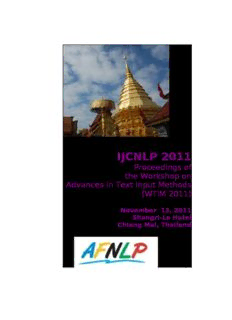
Workshop on Advances in Text Input Methods PDF
Preview Workshop on Advances in Text Input Methods
IJCNLP 2011 Proceedings of the Workshop on Advances in Text Input Methods (WTIM 2011) November 13, 2011 Shangri-La Hotel Chiang Mai, Thailand IJCNLP 2011 Proceedings of the Workshop on Advances in Text Input Methods (WTIM 2011) November 13, 2011 Chiang Mai, Thailand We wish to thank our sponsors Gold Sponsors www.google.com www.baidu.com The Office of Naval Research (ONR) Department of Systems Engineering and The Asian Office of Aerospace Research and Devel- Engineering Managment, The Chinese Uni- opment (AOARD) versity of Hong Kong Silver Sponsors Microsoft Corporation Bronze Sponsors Chinese and Oriental Languages Information Processing Society (COLIPS) Supporter Thailand Convention and Exhibition Bureau (TCEB) We wish to thank our sponsors Organizers Asian Federation of Natural Language National Electronics and Computer Technolo- Processing (AFNLP) gy Center (NECTEC), Thailand Sirindhorn International Institute of Technology Rajamangala University of Technology Lanna (SIIT), Thailand (RMUTL), Thailand Chiang Mai University (CMU), Thailand Maejo University, Thailand c 2011AsianFederationofNaturalLanguageProceesing (cid:13) vii Preface WelcometotheIJCNLPWorkshoponAdvancesinTextInputMethods(WTIM2011)! Methodsoftextinputhaveenteredanewera. Thenumberofpeoplewhohaveaccesstocomputersand mobile devices is skyrocketing in regions where people do not have a convenient method of inputting theirnativelanguage. Ithasalsobecomecommonplacetoinputtextnotthroughakeyboardbutthrough different modes such as voice and handwriting recognition. Even when people input text using a keyboard, it is done differently from only a few years ago – adaptive software keyboards, word auto- completion and prediction, and spell correction are just a few examples of such recent changes in text inputexperience. Thechangesareglobalandubiquitous: usersarenolongerwillingtoinputtextwithout thehelpofnewgenerationinputmethodsregardlessoflanguage,deviceorsituation. The challenges in text input have many underlying NLP problems in common. For example, a high qualitydictionaryiscalledfor,butitisfarfromobvioushowtoconstructandmaintainone. Adictionary also needs to be stored in some data structure, whose optimal design may depend upon the usage. Prediction and spell correction features can be very annoying if they are not smart enough. For many applications, user input can be very noisy (imagine voice recognition or typing on a small screen), so theinputmethodsmustberobustagainstsuchnoise. Weexpectinputmethodstolearnfromthehistory of text input, but we are yet to see such an intelligent system. Finally, there is no standard data set or evaluationmetric,whichisnecessaryforquantitativeanalysisofuserinputexperience. Thegoalofthisworkshopistobringtogethertheresearchersanddevelopersoftextinputtechnologies aroundtheworld,andsharetheirinnovations,researchfindingsandissuesacrossdifferentapplications, devices, modes and languages. This volume contains contributions on diverse aspects of text input methods research on a variety of languages. We hope that the workshop serves as a starting point for deepening our understanding of the field as a whole, and for facilitating further innovations in user text inputexperience. HidetoKazawa,HisamiSuzukiandTakuKudo Organizers,WTIM2011 viii Organizers: HidetoKazawa(Google,Japan) HisamiSuzuki(MicrosoftResearch,USA) TakuKudo(Google,Japan) ProgramCommittee: AchrafChalabi(CairoMicrosoftInnovationCenter,Egypt) FrankYung-FongTang(Google,USA) HaifengWang(Baidu,China) HiroyukiTokunaga(PreferredInfrastructureInc,Japan) JianfengGao(MicrosoftResearch,USA) KalikaBali(MicrosoftResearchIndia) KazumaTakaoka(JustSystems,Japan) KumikoTanaka-Ishii(UniversityofTokyo,Japan) MamoruKomachi(NaraInstituteofScienceandTechnology,Japan) MikeSchuster(Google,USA) MonojitChoudhury(MicrosoftResearchIndia) ShinsukeMori(KyotoUniversity,Japan) ThanarukTheeramunkong(SIIT,Thailand) VirachSornlertlamvanich(NECTEC,Thailand) YohOkuno(Yahoo! Japan) Co-sponsor(Keynotespeech): NaraInstituteofScienceandTechnology,Japan Keynotespeaker: ToshiyukiMasui(KeioUniversity,Japan) WorkshopHomepage: https://sites.google.com/site/wtim2011/ ix
Description: